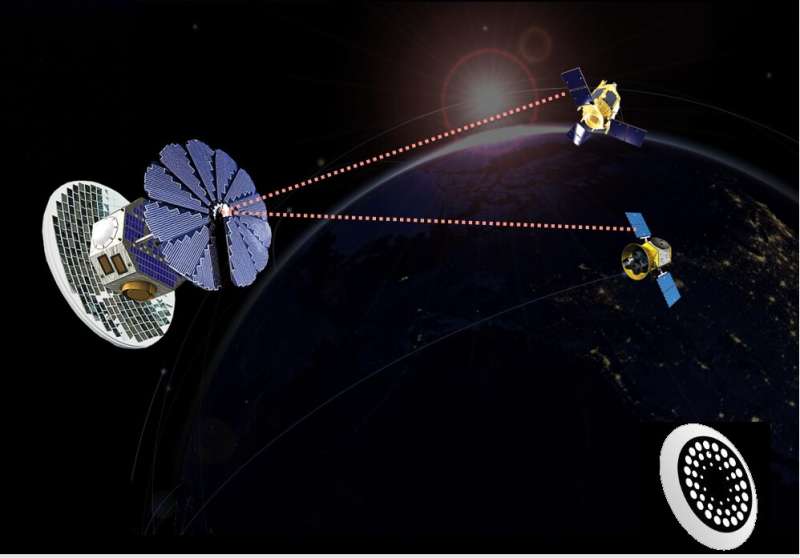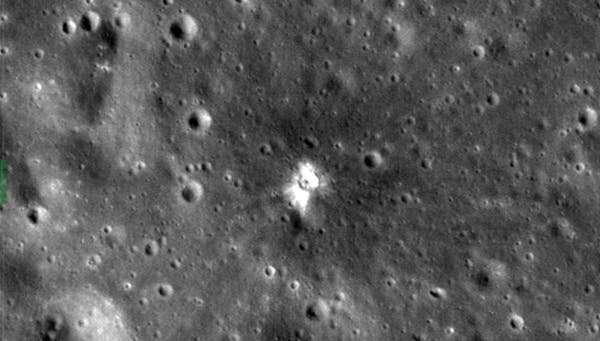
Copernical Team
Revolutionizing satellite power using laser beaming

The University of Surrey and Space Power are tackling the problem of powering satellites in Low Earth Orbit (LEO) during their eclipse period when they cannot see the sun. By collaborating on a space infrastructure project, the joint team will develop new technology which uses lasers to beam solar power from satellites under solar illumination to small satellites orbiting closer to Earth during eclipse. The wireless, laser-based power beaming prototype will be the first developed outside of governmental organizations and is aiming for commercialisation by 2025.
Wireless power beaming is a critical and disruptive technology for space infrastructure and will provide auxiliary power to increase the baseline efficiency of small satellites in LEO. The technical side of the project will use the highly specialized laser laboratories and optical systems developed at the University of Surrey's Department of Physics and Advanced Technology Institute, which are world leaders in the development and implementation of laser and photovoltaic-based technologies.
Crashing rocket will create new moon crater: What we should worry about

It's not often that the sudden appearance of a new impact crater on the moon can be predicted, but it's going to happen on March 4, when a derelict SpaceX Falcon 9 rocket will crash into it.
The rocket launched in 2015, carrying NASA's Deep Space Climate Observatory (DSCOVR) probe into a position 1.5 million kilometers from the Earth, facing the Sun. But the expended upper stage of the rocket had insufficient speed to escape into an independent orbit around the Sun, and was abandoned without an option to steer back into the Earth's atmosphere. That would be normal practice, allowing stages to burn up on re-entry, thus reducing the clutter in near-Earth space caused by dangerous junk.
Week in images: 24 - 28 January 2022

Week in images: 24 - 28 January 2022
Discover our week through the lens
Island in a lake of lava - the Martian volcano Jovis Tholus
 These images, created using data acquired by the High Resolution Stereo Camera (HRSC) on board ESA's Mars Express orbiter, show the Jovis Tholus volcano and various other landscape features, such as tectonic faults, impact craters and solidified lava flows, in the Tharsis region of Mars. The Tharsis uplift, which is several kilometres high, was one of the most active volcanic regions near the Ma
These images, created using data acquired by the High Resolution Stereo Camera (HRSC) on board ESA's Mars Express orbiter, show the Jovis Tholus volcano and various other landscape features, such as tectonic faults, impact craters and solidified lava flows, in the Tharsis region of Mars. The Tharsis uplift, which is several kilometres high, was one of the most active volcanic regions near the Ma Tiny but very large wavelength perturbations solve Hubble Tension
 It is generally believed that the Universe is isotropic and homogeneous on large distance scales, i.e., there is no preferred position or direction in the Universe. This hypothesis forms the basis of the standard Big Bang cosmology and is called the cosmological principle (CP). It implies that the Universe is expanding and, to a good approximation, has exactly the same properties at all spatial
It is generally believed that the Universe is isotropic and homogeneous on large distance scales, i.e., there is no preferred position or direction in the Universe. This hypothesis forms the basis of the standard Big Bang cosmology and is called the cosmological principle (CP). It implies that the Universe is expanding and, to a good approximation, has exactly the same properties at all spatial Instant turn-over of magnetism by gyro motion of relativistic electrons
 Magnetic fields are detected throughout the universe and widely participate in astrophysical dynamics. Various fundamental phenomena, including coronal mass ejections, solar flares, gamma-ray bursts and pulsar winds, are dominated by variations in magnetic fields.
Although the mechanisms involved in the origin of magnetic fields in space are still uncertain, one of the widely accepted plau
Magnetic fields are detected throughout the universe and widely participate in astrophysical dynamics. Various fundamental phenomena, including coronal mass ejections, solar flares, gamma-ray bursts and pulsar winds, are dominated by variations in magnetic fields.
Although the mechanisms involved in the origin of magnetic fields in space are still uncertain, one of the widely accepted plau Mysterious object unlike anything astronomers have seen before
 A team mapping radio waves in the Universe has discovered something unusual that releases a giant burst of energy three times an hour, and it's unlike anything astronomers have seen before.
The team who discovered it think it could be a neutron star or a white dwarf-collapsed cores of stars-with an ultra-powerful magnetic field.
Spinning around in space, the strange object sends out
A team mapping radio waves in the Universe has discovered something unusual that releases a giant burst of energy three times an hour, and it's unlike anything astronomers have seen before.
The team who discovered it think it could be a neutron star or a white dwarf-collapsed cores of stars-with an ultra-powerful magnetic field.
Spinning around in space, the strange object sends out NASA's MRO Finds Water Flowed on Mars Longer Than Previously Thought
 Mars once rippled with rivers and ponds billions of years ago, providing a potential habitat for microbial life. As the planet's atmosphere thinned over time, that water evaporated, leaving the frozen desert world that NASA's Mars Reconnaissance Orbiter (MRO) studies today.
It's commonly believed that Mars' water evaporated about 3 billion years ago. But two scientists studying data that M
Mars once rippled with rivers and ponds billions of years ago, providing a potential habitat for microbial life. As the planet's atmosphere thinned over time, that water evaporated, leaving the frozen desert world that NASA's Mars Reconnaissance Orbiter (MRO) studies today.
It's commonly believed that Mars' water evaporated about 3 billion years ago. But two scientists studying data that M China releases new-generation spacecraft OS
 China has released SpaceOS III, a new-generation operating system for spacecraft.
Developed by the Beijing Institute of Control Engineering under China Academy of Space Technology, the operating system has independent intellectual property rights. Earlier versions of SpaceOS have been used in more than 300 spacecraft.
According to SpaceOS developers, the system boasts outstanding rel
China has released SpaceOS III, a new-generation operating system for spacecraft.
Developed by the Beijing Institute of Control Engineering under China Academy of Space Technology, the operating system has independent intellectual property rights. Earlier versions of SpaceOS have been used in more than 300 spacecraft.
According to SpaceOS developers, the system boasts outstanding rel SCOUT releases autonomy software to enable safer and less complex space operations
 SCOUT Inc. has announced its latest Autonomy Software offerings: computer vision and guidance software to make navigation safer and less complex for space operators. These offerings include software-hardware integration providing: next-generation AI/ML-based autonomy, hybrid data fusion from various sensors, and closed-loop optical navigation control algorithms.
"Our first SCOUT-Vision sys
SCOUT Inc. has announced its latest Autonomy Software offerings: computer vision and guidance software to make navigation safer and less complex for space operators. These offerings include software-hardware integration providing: next-generation AI/ML-based autonomy, hybrid data fusion from various sensors, and closed-loop optical navigation control algorithms.
"Our first SCOUT-Vision sys 